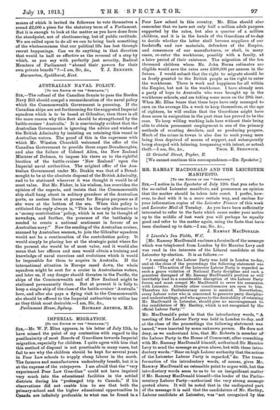AUSTRALIAN NAVAL POLICY.
[To THE EDITOR or THE "SPECTATOR.") SIR,—The refusal of the Canadian Senate to pass the Borden Navy Bill should compel a reconsideration of the naval policy which the Commonwealth Government is pursuing. If the Canadian ships are not forthcoming for the suggested Imperial squadron u hich is to be based at Gibraltar, then there is all the more reason why this fleet should be strengthened by the battle-cruiser Australia.' It is convincingly evident that the Australian Government is ignoring the advice and wishes of the British Admiralty by insisting on retaining this vessel in Australian waters. The proof of this is the eagerness with which Mr. Winston Churchill welcomed the offer of the Canadian Government to provide three super-Dreadnoughts, and also the failure of Colonel Allen, the New Zealand Minister of Defence, to impose his views as to the rightful location of the battle-cruiser New Zealand' upon the Iinperial naval authorities. The original offer of the Aus- tralian Government under Mr. Deakin was that of a Dread- nought to be at the absolute disposal of the British Admiralty, and to be stationed wherever it was thought it would be of most. value. But Mr. Fisher, in his wisdom, has overriden the opinion of the experts, and insists that the Commonwealth ship shall hang about in solitary grandeur at the Australian porta, as useless there at present for Empire purposes as if she were at the bottom of the sea. When this policy is criticized the reply always is, "This is the only alternative to a money contribution' policy, which is not to be thought of nowadays, and further, the presence of the battleship is needed to create a national sentiment in favour of an Australian navy." Now the sending of the Australian cruiser, nianned by Australian seamen, to join the Gibraltar squadron would not be a continuation of the contribution policy. It would simply be placing her at the strategic point where for the present she would be of most value, and it would also mean that her officers and men would obtain a training and knowledge of naval exercises and evolutions which it would be impossible for them to acquire in Australia. If the international situation in Europe eased down, the whole squadron might be sent for a cruise in Australasian waters, and later on, if any danger should threaten in the Pacific, the ships of the Commonwealth and of New Zealand might be stationed permanently there. But at present it is folly to keep a single ship of the class of the battle-cruiser Australia' here, and after she pays a flying visit to the Commonwealth she should be offered to the Imperial authorities to utilize her as they think most desirable.—I am, Sir, &c., Parliament House, Sydney. RICHARD ARTHUR,










































 Previous page
Previous page